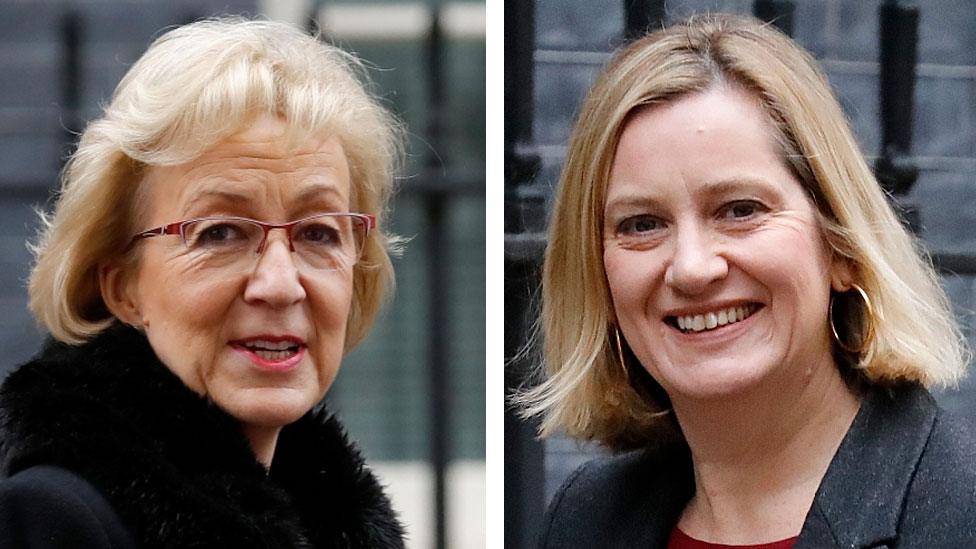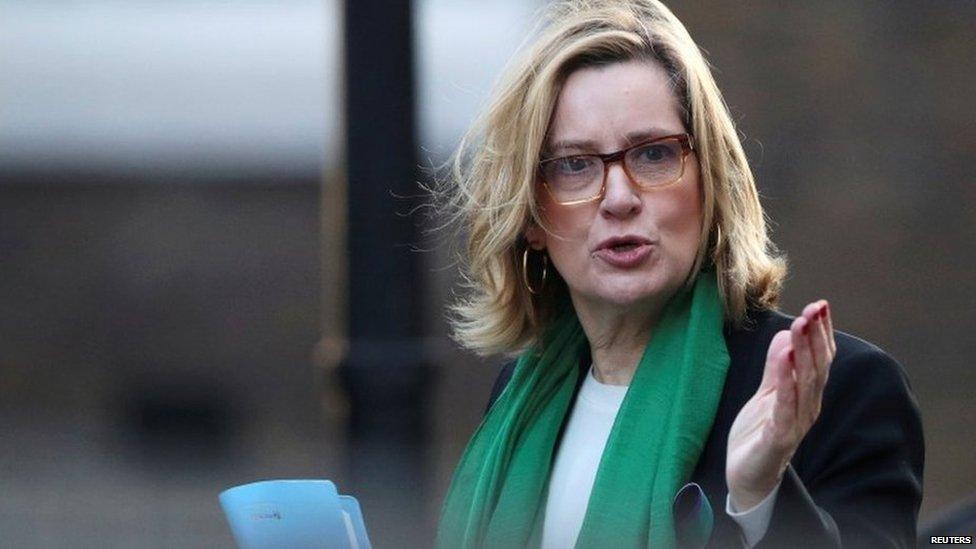Andrea Leadsom and Amber Rudd suggest rival Brexit 'Plan Bs'
- Published
- comments

Cabinet colleagues Andrea Leadsom and Amber Rudd have set out rival plans if Theresa May can't get her Brexit deal through Parliament.
The two ministers stressed that their top priority was securing Parliamentary backing for the prime minister's deal.
But Ms Rudd said a referendum was a "plausible" way forward if MPs were deadlocked.
Mrs Leadsom said a new referendum would be "unacceptable" and argued instead for a "managed no deal".
Downing Street dismissed both suggestions.
Asked if a second referendum was plausible if Parliament remains gridlocked, the prime minister's official spokesman said: "No."
Mrs May had "been very clear on the dangers of calling a second referendum" and Amber Rudd had been "clear" that the priority was to get the prime minister's deal through Parliament, he added.
Asked about Mrs Leadsom's comments on a managed no-deal Brexit, the spokesman said: "The Leader of the House was clear this is not government policy.
"This is not something that is available. The EU has been very clear that there is no withdrawal agreement available that does not include a backstop."
Speaking at a press conference in Downing Street, with the Polish prime minister, Mrs May said all cabinet ministers were "working to ensure that the deal is able to be agreed by, and get through, Parliament".
Mrs May also spoke Polish during the press conference:
"My message to Polish people is clear"

Explaining what she meant by a "managed no deal", Mrs Leadsom told BBC Radio 4's Today programme: "A managed no deal does not necessarily mean there is no withdrawal agreement at all."
The Commons leader, who was a Leave campaigner in the 2016 EU referendum, said it could be a stripped-down agreement incorporating some of the EU's no-deal preparations.
"What I am looking at is trying to find an alternative so that in the event that we cannot agree to this deal that there could be a further deal that looks at a more minimalist approach but enables us to leave with some kind of implementation period.
"That avoids a cliff edge, that avoids uncertainty for businesses and travellers and so on."
Asked about Amber Rudd's suggestion that a referendum was a "plausible" alternative, she said: "It's not government policy.
"I myself think it would undermine the biggest democratic exercise ever, where we had a clear majority to leave the European Union.
"To have a second referendum would unfortunately be going back to people and telling them they have got it wrong and they needed to try again.
"I think it would be unacceptable."

The UK is due to leave the EU on 29 March 2019 but an agreement on the terms of its withdrawal and a declaration on future relations will only come into force if the UK and EU Parliaments approve it.
The Commons vote was due to be held earlier this month but the PM postponed it once it became clear it would be defeated by a large margin.
She has since sought to gain further assurances from EU leaders to allay MPs' concerns.
MPs will start debating her Brexit bill again on Wednesday, 9 January. There will be five days of debate before the vote takes place.
If Mrs May's deal is rejected, the default position is for the UK to leave in March unless the government seeks to extend the Article 50 negotiating process or Parliament intervenes to stop it happening.
Ms Rudd, who campaigned for Remain in 2016, said she was not sure MPs would back Mrs May's deal and suggested arguments for another referendum would come into play if they did not and if they rejected other options.
"I have said I don't want a People's Vote or referendum in general but if parliament absolutely failed to reach a consensus I could see there would be a plausible argument for it," the work and pensions secretary told ITV's Robert Peston show.
"Parliament has to reach a majority on how it is going to leave the EU. If it fails to do so, I can see the argument for taking it back to the people again as much as it would distress many of my colleagues."

Analysis
By BBC Political Correspondent Chris Mason
On page three of the Ministerial Code, external, is the section entitled "collective responsibility".
Page 19 offers something approaching a definition: "Ministers should ensure that their statements are consistent with collective Government policy. Ministers should take special care in referring to subjects which are the responsibility of other Ministers."
Or: row in private, be loyal in public.
Let's be clear: those cabinet ministers offering a commentary on other options preface their remarks by insisting they back the prime minister's deal.
But imagine, in calmer times, ministers did this before a budget, or floated an alternative to Universal Credit for instance.
It would be a suggestion probably accompanied by the sack.
But these, you'll have spotted dear reader, are not the calmest of times.
And so cabinet ministers can get away with a whole lot more freelancing.
But it is not entirely unhelpful to Downing Street: if this aeration of alternatives helps expose their lack of support, it allows the prime minister to make the case her deal is the only game in town.

Amber Rudd - who went head-to-head with Mrs Leadsom in a televised debate during the 2016 referendum - has likened the idea of a no-deal exit to a car crash. She said it was imperative that MPs "find a way of getting a deal through Parliament".
To that end, she said she backed the idea of testing the will of Parliament through a series of "indicative" votes on "Plan B" options should MPs reject the PM's agreement.
"It would flush out where... the majority is," she said. "So people who hold on to the idea of one option or another would see there is no majority and so they will need to move to their next preference.
"We will hopefully be able to find where the compromise and the consensus is."
Speaking on the same programme, Labour's shadow education secretary Angela Rayner said talk of another referendum was "hypothetical" at this stage and would represent a "failure" by Parliament.
She accused the prime minister of trying to scare MPs into backing her deal by delaying the vote on it to the latest possible date.
Earlier on Wednesday, the European Commission announced a series of temporary measures designed to reduce the economic impact if the UK was to leave without a comprehensive legally-binding agreement.
But it made clear that it could not counter all the problems it expects.
The Republic of Ireland, external has given more details of its own no-deal contingency planning, saying the risk of the UK leaving without an agreement was "very real".
It warns of potentially "severe macroeconomic, trade and sectoral impacts" for Ireland as well as "significant gaps" in policing and judicial co-operation.
In such a scenario, it said its priorities would be to uphold the Common Travel Area between the UK and Ireland, ensure there is no return of physical checks on the border between the Republic and Northern Ireland and ensure the "best possible outcome" in terms of trade.
The UK has allocated a further £2bn in funding to government departments to prepare for the possibility and has urged businesses to put their own no-deal plans in motion.
